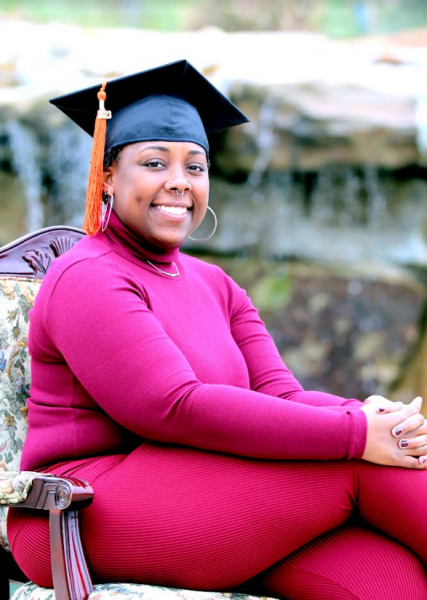Mechanical engineering graduate’s dedication to research paves way for Ph.D. pursuit

With three universities and roughly four years of college under her belt, Valesia Davis was still looking for the right fit. She tried different majors as well as institutions, but finally found her place as a mechanical engineering major in the Allen E. Paulson College of Engineering and Computing and a mathematical sciences minor in the College of Science and Mathematics at Georgia Southern University.
“I started off as a computer engineering major at a college in Daytona, Florida, right after high school,” Davis said. “After a summer program there, I moved to a school in Savannah, then one in Atlanta before COVID hit. When that happened, I decided to take a year off to really explore my next steps. It was great to meet people and form connections at each university, but, looking at my future, I found Georgia Southern had an excellent mechanical engineering program and I knew I wanted to be a part of that.”
Davis’ shift to mechanical engineering came from her love of working with physical projects. Hands-on work is something Davis got a lot of experience with at Georgia Southern as a student research assistant.
“Participating in hands-on research gives you a much better understanding of the concepts and theories you learn about in the classroom,” Davis said. “Looking at equations is one thing, but when you see those equations take life in front of your eyes, it’s really cool. It makes the applicability of the work more tangible than it is in a classroom and that’s why I love doing it.”
Most recently, Davis participated in research on an artificial pancreas system that is being developed through a grant from the Juvenile Diabetes Research Foundation that was awarded to Sevki Cesmeci, Ph.D., assistant professor of mechanical engineering at Georgia Southern.
“In the mechanical engineering classroom we don’t talk a lot about applications to biomedical fields, but the research you can participate in in this field is actually incredibly varied,” Davis said. “Being a part of research like this really shows you the human impact of your work as you step outside yourself and recognize all of the people in the world who struggle with type 1 diabetes on a daily basis.”
In combination with her research participation, Davis has also traveled the country presenting the work at local, regional and national conferences.
“My favorite conference had to be in Anaheim, California,” Davis said. “It was the annual Biomedical Research Conference for Minoritized Students, which was an amazing opportunity to network with other women and underrepresented populations doing amazing work in STEM. It was really encouraging to connect with other people like me in my field.”
Her travel for conference presentations was sponsored by the Ronald E. McNair Post-baccalaureate Achievement Program. Funded by the U.S. Department of Education, the program prepares underrepresented, high-performing students for graduate school.
“I knew that after my undergrad I wanted to work toward my Ph.D,” Davis said. “The McNair Scholars program was perfect for that because they really encouraged me through the college process. Without it, I wouldn’t have been able to go to these conferences and present the research we’ve been working so hard on.”
The McNair Scholars program also provided introductions to additional funding opportunities for future studies.
“The director, Issac Taylor, talked to me about scholarships and fellowships that I didn’t even know existed,” Davis said. “One of the major ones he encouraged me to apply for was the GEM Fellowship and, after going through the process, I was selected.”
The GEM Fellowship Program is part of the National GEM Consortium and focuses on supporting individuals from underrepresented populations in finding opportunities to participate in graduate level research and development, product development and high-level technical careers.
“This was an amazing opportunity,” Davis said. “To have my graduate school paid for is a major relief. They pay for tuition, housing and provide a stipend, but you have to be accepted by a GEM employer partner before you can be approved and, thankfully, I was accepted by Lam Research.”
Davis will cross the stage at Allen E. Paulson Stadium on May 11 with her bachelor’s degree before moving to California just one week later to begin her position at Lam Research. Her advice for others looking to go into a STEM field is simple: go for it.
“Being a minority, a lot of times, we don’t get as many opportunities as others,” Davis said. “But I would encourage others to not think about where you come from or what you look like as something that will detract from who you are and what you know. If you want something, you can go and get it. Put yourself out there, be open to different possibilities and the opportunities will come.”
Posted in Graduate Stories, Press Releases

